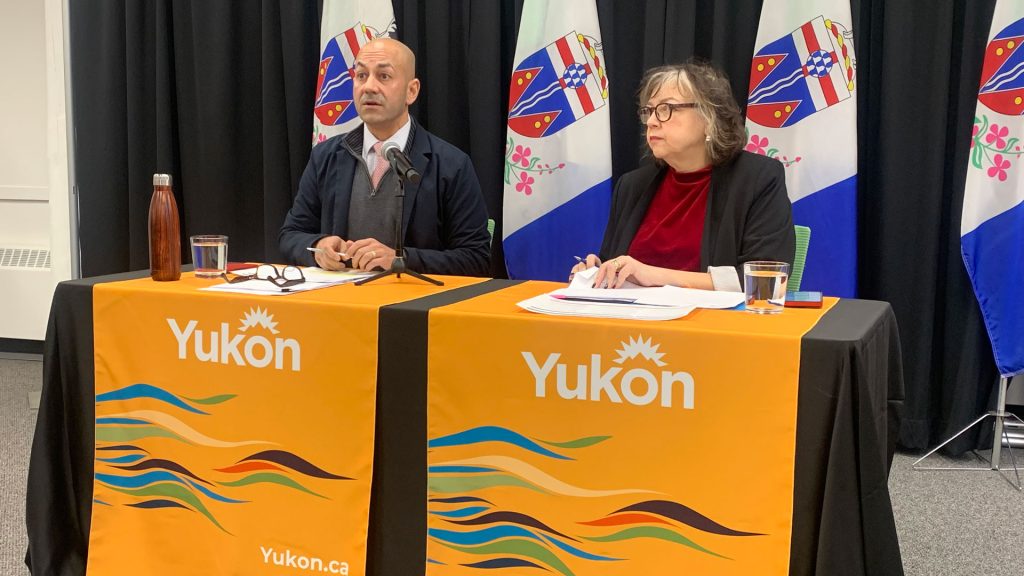
Premier Ranj Pillai and Health and Social Services Minister Tracy-Anne McPhee announcing their new action plan on Dec. 21. Photo: Sara Connors/APTN
Yukon government says it has a new action plan to tackle safety issues in Whitehorse’s downtown core. The plan, which is geared toward helping vulnerable people access services downtown as well as promoting public safety for residents and businesses, aims to promote “safety, health and overall wellbeing of downtown Whitehorse.”
Premier Ranj Pillai and Health and Social Services Minister Tracy-Anne McPhee presented the new plan at a press conference on Thursday.
“It’s a roadmap aimed at enhancing the safety, health, and overall well-being of our downtown Whitehorse community,” Pillai said. “At the end of the day, what we’re doing is about making life for people better.”
The Whitehorse Emergency Shelter, located downtown, has been a topic of discussion in recent months.
The government has faced criticism from business owners and community members who have been impacted by disturbances and crimes caused by shelter users.
Around 90 per cent of shelter users are Indigenous. McPhee said her government is committed to addressing the issue.
“We have a responsibility to serve our most vulnerable people in this community and to balance (that with making) our community safe,” she said.
The new plan features several medium and long-term actions.
They include developing a rapid housing initiative to provide supportive and emergency housing, establishing a residential-managed alcohol program and possibly forming a community restorative justice circle.
McPhee said her government is also working with the city to develop a community safety plan and wellbeing plan.
“We’ve heard too many stories of people experiencing break-ins and other crimes, but we should be careful about assuming that those crimes are somehow related to the people that access services,” she said.
Pillai noted several completed initiatives his government has already undertaken, such as removing gathering benches outside of the shelter and hiring a private security firm to patrol the downtown core.
He noted the security firm has had success with local business owners. The program, he said, has received $50,000 in funding over two months and will receive another $50,000 to $100,000 for the 2024-25 fiscal year.
Funding will also be extended the following fiscal year to a new mobile safety pilot project operated by the Council of Yukon First Nations. The pilot, which will operate similar to Winnipeg’s Bear Clan Patrol, received $300,000 in funding from the government this year.
The government officials noted the work ahead would not be easy, though both emphasized the importance of having a shelter and other services, like the government-run supervised consumption site, in downtown locations.
Their location, Pillai said, is important for accessibility, especially as the territory continues to grapple with a tainted drug supply.
“It’s really important that people have an opportunity to go there,” he said.
McPhee pointed out that between October 2020 and October 2023, staff at the supervised consumption site had saved 38 people from overdosing.
While McPhee could not pinpoint the most pressing action item, she noted public perception has been an ongoing challenge and an important priority.
“It only becomes resolved when we do the actual work to provide services for people and make sure that those things are progressing in a way that’s supportive,” she said.
“We’re listening to the individual businesses and the individuals who live downtown to make sure that their lives are also affected in a way that is positive.”










